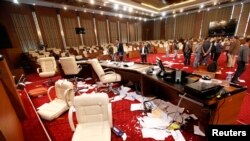ROME —
Western countries voiced concern on Thursday that tensions in Libya could slip out of control in the absence of a functioning political system, and they urged the government and rival factions to start talking.
Two-and-a-half years after the fall of former leader Moammar Gadhafi, the oil-rich North African state is struggling to contain violence between rival forces, with Islamist militants gaining an ever-stronger grip on the south of the country.
"The situation in Libya is very worrying," French Foreign Minister Laurent Fabius told reporters on the margins of a conference in Rome to discuss the Libyan crisis.
He said the uncertain security position, especially in the south, worsened an unstable political situation which required Libyan political forces to come together to reach a solution.
"We are asking the Libyans to talk to each other and to find a stable solution," he said.
The conference in Rome was overshadowed by the crisis in Ukraine, with a hectic round of bilateral talks at the margins culminating in a 40-minute meeting between U.S. Secretary of State John Kerry and Russian Foreign Minister Sergei Lavrov.
But with violent disputes between rival tribal factions disrupting exports of Libyan oil, the lack of a stable political foundation is causing growing concern for energy-hungry western countries, several of which were involved in overthrowing the Gadhafi government.
"It's incredibly important for the simple reason that oil is clearly a key driver of the economy," said Hugh Robertson, a junior minister in Britain's Foreign Office. "As long as the economy remains depressed that means there are a lot of young people in Libya for whom there is no real viable future inside a new democratic state of Libya."
Militias
The weak government in Tripoli is struggling to control well-armed former anti-Gadhafi rebels and Islamist militias, while parliament was stormed by protestors at the weekend who blamed the politicians for the growing chaos.
The United Nations Special Rapporteur Tarek Mitri said the Libya situation would be discussed at a Security Council meeting on Monday.
"There must be a consensus also within Libya to address what seems like the intractable problem of insecurity," he said.
However no concrete decisions were announced after the meeting beyond vague promises of help with security.
Libyan Foreign Minister Mohamed Abdulaziz pointed to the difficulties of creating a stable political culture in a country that had only recently gone through a civil war after four decades of authoritarian rule.
"We do not deny that we have political struggles and problems," he said. "We suffer from the absence of a regime.
Libya was kidnapped for more than 40 years. Political parties were forbidden under the former regime."
But he said that stability and security could not be the responsibility of Libya alone, which was fundamentally weaker than neighbouring states in North Africa and the Middle East.
"We suffer from the inexistence of institutions, and that's what makes us different from Tunisia and Egypt," he said.
Two-and-a-half years after the fall of former leader Moammar Gadhafi, the oil-rich North African state is struggling to contain violence between rival forces, with Islamist militants gaining an ever-stronger grip on the south of the country.
"The situation in Libya is very worrying," French Foreign Minister Laurent Fabius told reporters on the margins of a conference in Rome to discuss the Libyan crisis.
He said the uncertain security position, especially in the south, worsened an unstable political situation which required Libyan political forces to come together to reach a solution.
"We are asking the Libyans to talk to each other and to find a stable solution," he said.
The conference in Rome was overshadowed by the crisis in Ukraine, with a hectic round of bilateral talks at the margins culminating in a 40-minute meeting between U.S. Secretary of State John Kerry and Russian Foreign Minister Sergei Lavrov.
But with violent disputes between rival tribal factions disrupting exports of Libyan oil, the lack of a stable political foundation is causing growing concern for energy-hungry western countries, several of which were involved in overthrowing the Gadhafi government.
"It's incredibly important for the simple reason that oil is clearly a key driver of the economy," said Hugh Robertson, a junior minister in Britain's Foreign Office. "As long as the economy remains depressed that means there are a lot of young people in Libya for whom there is no real viable future inside a new democratic state of Libya."
Militias
The weak government in Tripoli is struggling to control well-armed former anti-Gadhafi rebels and Islamist militias, while parliament was stormed by protestors at the weekend who blamed the politicians for the growing chaos.
The United Nations Special Rapporteur Tarek Mitri said the Libya situation would be discussed at a Security Council meeting on Monday.
"There must be a consensus also within Libya to address what seems like the intractable problem of insecurity," he said.
However no concrete decisions were announced after the meeting beyond vague promises of help with security.
Libyan Foreign Minister Mohamed Abdulaziz pointed to the difficulties of creating a stable political culture in a country that had only recently gone through a civil war after four decades of authoritarian rule.
"We do not deny that we have political struggles and problems," he said. "We suffer from the absence of a regime.
Libya was kidnapped for more than 40 years. Political parties were forbidden under the former regime."
But he said that stability and security could not be the responsibility of Libya alone, which was fundamentally weaker than neighbouring states in North Africa and the Middle East.
"We suffer from the inexistence of institutions, and that's what makes us different from Tunisia and Egypt," he said.












